|
|
|
Sort Order |
|
|
|
Items / Page
|
|
|
|
|
|
|
| Srl | Item |
| 1 |
ID:
192517
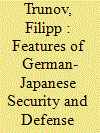

|
|
|
|
|
| Summary/Abstract |
Historically, both Germany and Japan have played significant roles in establishing a new world order. Today, the two countries are actively influencing the transformation of the "collective West" and its relations with the non-West. The role played in these processes by official Berlin, as well as by Tokyo, could considerably increase if they establish multi-channel and comprehensive security and defense cooperation. This paper seeks to explore the peculiarities and prospects of such cooperation in the early 2020s.
|
|
|
|
|
|
|
|
|
|
|
|
|
|
|
|
| 2 |
ID:
089825
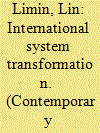

|
|
|
|
|
| Publication |
2009.
|
| Summary/Abstract |
The international system has undergone two major transformation in modern history, first from a loose, scattered regional pattern into a centrally unified global structure, then from British to American domination of such a global architecture. A third one is underway. East-West condominium will potentially replace the current US or West-led global order. Based on historical experience, this article attempts to make a forward-looking analysis of the way, direction and form of the unfolding trajectory through exploring the general law governing this process.
|
|
|
|
|
|
|
|
|
|
|
|
|
|
|
|
| 3 |
ID:
125025
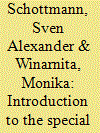

|
|
|
|
|
| Publication |
2013.
|
| Summary/Abstract |
The second half of the twentieth century witnessed the rise of what might arguably be described as political religion, with faith traditions everywhere experiencing parallels to the rise of Hindutva in India or the 'muscular' and virulently anti-minority political Buddhism of Sri Lanka and Myanmar. Similarly, Israel, a country founded by cosmopolitan, social-democratic nineteenth century perceptions of Jewish 'national' identity, is increasingly struggling with its ostensibly secular founding ethos. Religiously conservative political parties and attitudes have become mainstreamed in Israel's political landscape in the last couple of decades.1 What might help account for these seemingly similar developments, all of which appear to contradict the basic dictum of secularization theory, namely that increasingly prosperous, urban and industrialized societies will relegate religion and religious practices to the private sphere of a personal 'faith'? Until recently, the assumption persisted that the historical experience of Western Europe, the first part of the world to undergo industrialization and the wider sociocultural effects associated with the process of 'secularization', would be replicated as other parts of the world modernized. An important debate has ensued over the past 20 years or so, involving scholars representing a wide range of disciplinary backgrounds over what appears to be the revitalization of religion and even possibly processes of de-secularization.
|
|
|
|
|
|
|
|
|
|
|
|
|
|
|
|
| 4 |
ID:
178796
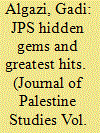

|
|
|
|
|
| Summary/Abstract |
Tasked with selecting two documents specifically related to Israel and the Israeli settler-colonial enterprise from the fifty-year JPS archive, author Gadi Algazi settles on “History’s Verdict: The Cherokee Case” (1995) by Norman Finkelstein and “The Palestinians Seen through the Israeli Cultural Paradigm” (1987) coauthored by Aziz Haidar and Elia Zreik. While the former points to the historical affinities between the Zionist colonization of Palestine and the settlement of North America (including early Zionists’ unabashed identification with the “white” colonizers of the continent), the latter elucidates Israel’s “culturalist account” of Palestinians, which views the main problem with Palestinians in Israel as their “culture,” and not the colonization, repression, and exclusion they experienced historically and continue to endure.
|
|
|
|
|
|
|
|
|
|
|
|
|
|
|
|
| 5 |
ID:
153507
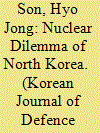

|
|
|
|
|
| Summary/Abstract |
Why does North Korea continue to insist on maintaining a nuclear program despite
its potential to be detrimental to the regime in the long term? This article argues
that North Korea’s nuclear development strategy is derived from policymakers’
cognitive systems and norms that have accumulated over the decades. This study
especially attempts to examine the mechanism behind how the normative system
shaped by North Korea’s historical environment generates and re-generates nuclear
strategy through nuclear discourse by applying the lens of Strategic Culture. It
begins with a critical assessment of previous research on the motives of a nation
or regime’s nuclear development policy and proposes the suitability of Strategic
Culture for North Korea’s case. This article then characterizes North Korea’s
Strategic Culture as a “Wartime Preferring Strategic Culture” which emphasizes
the norm of the “prioritization of military values,” “closed groupism,” and “deontic
mass mobilization.” These norms are based on the policymakers’ cognitive systems
related to the fear of regime cleavage. Consequently, North Korea’s Strategic
Culture, which is based on fear perception, influenced policy makers and drove
them to strengthen nuclear development.
|
|
|
|
|
|
|
|
|
|
|
|
|
|
|
|
| 6 |
ID:
181381
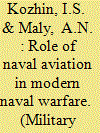

|
|
|
|
|
| Summary/Abstract |
The authors describe the role of Russian naval aviation (NA) in naval warfare during the Great Patriotic War and military conflicts in the late 20th and early 21st centuries. They analyze NA contribution to performing various Navy missions in current and potential military conflicts.
|
|
|
|
|
|
|
|
|
|
|
|
|
|
|
|
| 7 |
ID:
138741
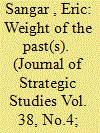

|
|
|
|
|
| Summary/Abstract |
This article seeks to explain the basic dynamics of the development of the German military approach in Afghanistan between 2003 and 2010 by looking at the impact of the Bundeswehr’s established uses of historical experience. First, the German military approach in Afghanistan has slowly evolved from a peacebuilding and mediation mission towards a full-fledged combat deployment. Second, the Bundeswehr’s exclusive focus on the World War II experience has contributed to the emergence of the Balkans experience as a formative experience that shaped initial operational thinking in Afghanistan. Third, because a thorough debate on the historical foundation of counterinsurgency remained absent, the operational shift in 2009 was perceived as a return to ‘classical’ military tasks and thus led to an almost exclusive focus on training for combat.
|
|
|
|
|
|
|
|
|
|
|
|
|
|
|
|
|
|
|
|
|